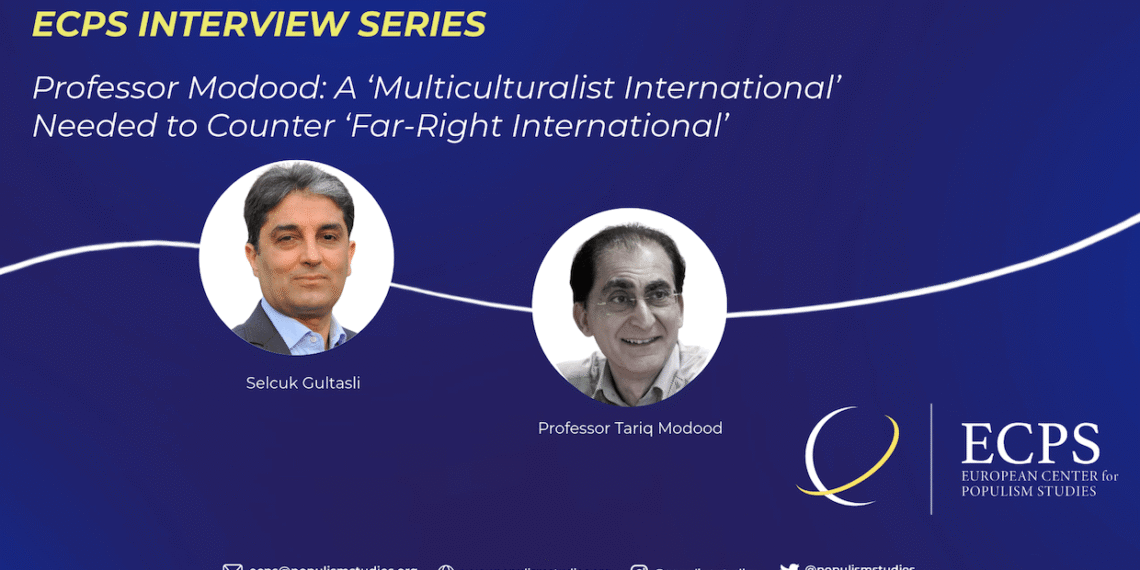In this wide-ranging interview with ECPS, Professor Tariq Modood calls for the creation of a “multiculturalist international” to counter the rise of far-right transnational networks and exclusionary nationalisms. Highlighting the dangers posed by xenophobia, Islamophobia, and authoritarian populism across Europe and beyond, Professor Modood argues that multiculturalism is “not simply a reaction to populism… it is a positive vision” that affirms shared citizenship while respecting diversity. He contrasts his model of “moderate secularism” with French laïcité and Hindu nationalist secularism, emphasizing inclusivity and equality. Brexit, he notes, weakened the EU’s capacity for multicultural integration: “We need to create a multiculturalist alliance across countries, in the way that the far right is creating its own transnational network.”
Interview by Selcuk Gultasli
In an era marked by the transnational rise of far-right populism, exclusionary nationalism, and algorithmically amplified xenophobia, Professor Tariq Modood, the founding Director of the Bristol University Research Centre for the Study of Ethnicity and Citizenship, offers a deeply considered and nuanced account of how multiculturalism can serve as both a critique of and alternative to these reactionary forces. As one of Europe’s leading theorists of multicultural citizenship, Professor Modood’s work insists on reconciling respect for ethno-religious group identities with an inclusive and reconstituted national identity—a project he characterizes as “multicultural nationalism.”
In this interview with the European Center for Populism Studies (ECPS), Professor Modood explains that his vision of multiculturalism is “not simply a reaction to populism, nor a political strategy against it; it is a positive vision.” For Professor Modood, multiculturalism affirms that “we are not just individuals” but also members of groups whose identities have historically been marginalized or excluded from full membership in national life. Yet this project is integrative, not separatist: “We must not become anti-national. We must oppose the exploitation of national identity to exclude, racialize, or degrade others,” he emphasizes, rejecting both monocultural nationalism and cosmopolitan detachment.
A key element of Professor Modood’s thought is his advocacy for “moderate secularism,” which contrasts sharply with both French laïcité and authoritarian appropriations of secularism in places like India. Unlike the rigid secularism that seeks to privatize or marginalize religion, moderate secularism recognizes the public role of religious identities while embedding them in democratic equality and inclusion: “Moderate secularism can be inclusionary and potentially develop in a multiculturalist direction,” he explains.
In response to the global diffusion of far-right discourse—whether through social media networks or coordinated political strategies—Professor Modood argues for an explicitly internationalist response rooted in multicultural values. “I would like to say that one way of resisting that is trying to create a multiculturalism international—not just a far-right international, but a multiculturalism international,” he asserts. Brexit, in this regard, represented a significant setback: “When we left the European Union, much against my wishes, the European Union became weaker in relation to multiculturalism and anti-racism.”
Throughout this wide-ranging conversation, Professor Modood emphasizes that multicultural nationalism requires a “rethinking of our national identity and national story so that minority identities can become part of the national identity,” offering examples from Britain’s imperial history and inclusive popular culture, such as the 2012 London Olympics. His vision ultimately calls for a democratic, pluralistic, and solidaristic reimagining of national belonging—an urgent project in a time of resurgent authoritarianism.


